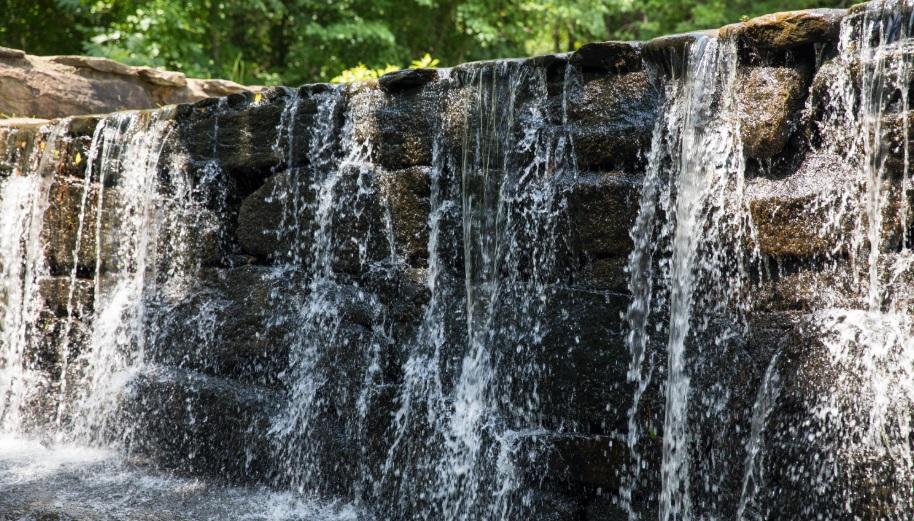
The centerpiece of the 174-acre park is Historic Yates Mill, which is the last operable water-powered gristmill in Wake County (more than 70 water mills once existed in the area). The Mill and the property surrounding it were purchased in 1963 by NC State University. The Mill was placed on the National Register of Historic Places in 1974 and was restored to working order through a grassroots community effort by 2005.
The park was developed by, and is managed through, a partnership effort among Wake County Parks, Recreation and Open Space, NC State University and the nonprofit group Yates Mill Associates (YMA). The University owns the property while Wake County operates, maintains and interprets the park, including the 20-acre Mill Pond, and YMA operates and maintains the Mill. The park opened to the public in May 2006 and hosts over 100,000 visitors per year.
Park Mission Statement:
In the tradition of a great state which celebrates its past, cherishes its heritage and nurtures its resources for future generations, Historic Yates Mill County Park interprets and preserves our agricultural heritage, and environmental and historical resources, while providing cultural enrichment and a sense of stewardship made possible by public and private partnerships.
Park Hours
Park Grounds and Trails: 8 a.m. to sunset, seven days a week
A.E. Finley Center: 8:30 a.m. to 5 p.m., seven days a week
Historic Mill Building: The inside of the building is accessible during scheduled tour times.
The park and all facilities are closed four days a year – on Thanksgiving Day, Christmas Eve, Christmas Day and New Year's Day.
Park News
Job Openings

Park Manager
Join our team! Wake County Parks, Recreation and Open Space seeks a Park Manager for Historic Yates Mill County Park and Crowder County Park.
We’re looking for an innovative Park Manager with proven experience ensuring visitors have safe and enjoyable park experiences through visitor services, historic preservation, stewardship, educational and recreational programming and park management. Learn more and apply here.
All available positions with Wake County Parks can be found here.
Newsletters
Find out everything happening in the park for the month! Subscribe to get monthly newsletters delivered straight to your email. Find out about programs, specific closing times and current park projects.
Park Programs & Tours
Check out our November 2024 and our December 2024 programs here!
You can also visit our public programming page for more information, and for program registration.
Park Information
Park Rules
Safety and enjoyment go hand in hand at Historic Yates Mill County Park. The following rules have been established to ensure a safe and pleasant visit.
-
Park only in designated areas.
-
Dogs and other pets are prohibited. ADA service animals are welcome.
-
Hike on the designated trails. Bikes, off-road vehicles and horses are prohibited.
-
Fishing is allowed on the pond boardwalk. All North Carolina freshwater fishing regulations apply. Bank fishing is prohibited.
The following are prohibited:
-
Walking or climbing on the mill or dam
-
Open fires
-
Alcoholic beverages
-
Tobacco and vapor products
-
Hunting
-
Collection or release of any natural material or living organism unless otherwise designated by Wake County Parks, Recreation and Open Space staff
-
Amplified music
-
Swimming and personal boating
-
Metal detectors and the collection/removal of artifacts
-
Firearms and explosives of any kind, per NCSU Policy REG 06.05.01
-
Geocaches and other off-trail activities
-
Drones may be used only in the open field above the amphitheater, if other people are not present in this area. Drones are not allowed to fly elsewhere in the park, unless the operator has received prior approval from Park Management. This approval is given only for environmental research-related purposes.
Photography at Historic Yates Mill County Park
Are you a professional or amateur photographer interested in taking photos at Historic Yates Mill County Park? Wake County’s parks and preserves provide the perfect backdrop for your bridal, graduation, prom or family photos. To ensure that all park visitors have an enjoyable experience, registration is required for professional, client-based photo shoots.
Photography is prohibited:
-
Under the mill
-
On the mill dam beyond the south side abutment (i.e., spillway “bump-up”)
-
Beyond the wooden arm located near the waterwheel
-
At least 20 feet from the waterwheel on the south side of the creek
No glitter, confetti, or balloon releases are permitted, as they can create a mess for staff and potentially harm wildlife.
Picnicking
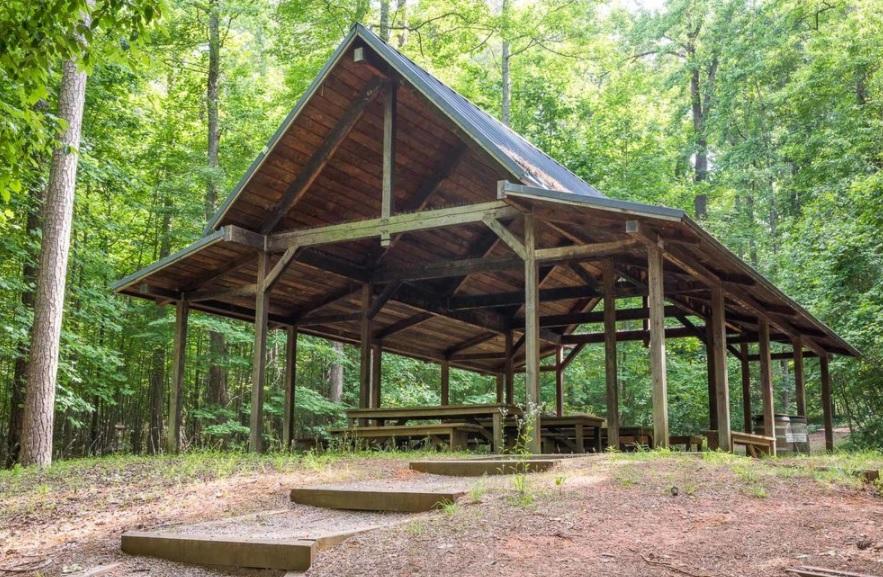
There are opportunities to have an enjoyable picnic at the park. Picnic tables are scattered throughout the park and available on a first-come, first-served basis. There are no available grills, and open flame is prohibited in the park.
Picnic tables and the field classroom cannot be reserved.
Fishing Rules and Regulations
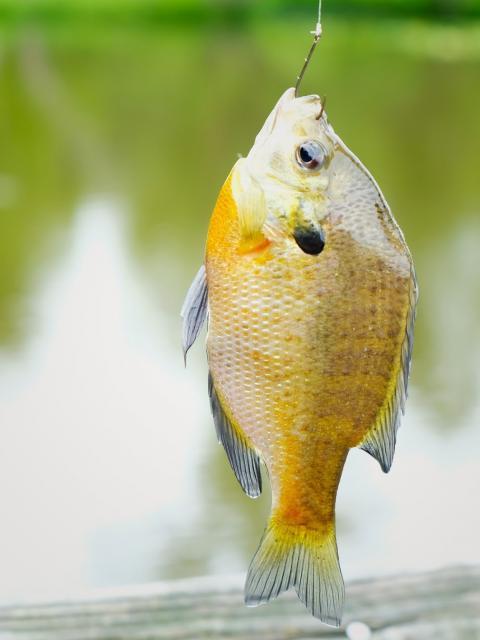
Fishing is allowed from the Pond Boardwalk only.
All baits except minnows are allowed. Note that all North Carolina Wildlife Resources Commission Rules and Regulations apply; adults must have a NC fishing license.
HISTORIC YATES MILL COUNTY PARK FISHING RULES AND REGULATIONS
- Fishing is only allowed from the pond boardwalk and upper boardwalk only. There is no bank fishing.
- There is a one-pole limit per fisherman on the pond.
- As of January 1, 2007, everyone 16 years of age or older is required to possess a state fishing license, no matter the type of bait being used and place of residence. Proof of age and residence must be shown to proper authorities upon request.
- Minnows cannot be used as bait at Yates Mill Pond.
- No cast nets.
- Fishermen must clean up any trash, fishing tackle and fishing line left behind at the end of their fishing trip.
- No smoking in the park.
FAILURE TO ABIDE BY THESE RULES COULD RESULT IN FISHERMEN LOSING THEIR PRIVILEGE TO FISH AT YATES MILL POND!
Metal Detecting and Magnet Fishing
Wake County Parks, Recreation & Open Space has a "No Collection" policy that does not allow visitors to take things (natural or man-made) from the parks. Our parks contain both historically significant structures and documented cemeteries that should not be disturbed.
Metal detectors and magnet fishing may be used to look for an item you have specifically lost, but not to "treasure hunt" in general. The Park Manager must be notified and grant permission in advance of using a metal detector or magnet fishing to search for a personal lost item.
Drones/RC Vehicles/Model Rockets
The use of Unmanned Aircraft, Remote Control Vehicles and Model Rockets is allowed subject to the following regulations:
- Users must comply with all state and federal regulations governing their use.
- FAA regulations restrict drone use within five miles of an airport. The Wake County portion of the American Tobacco Trail, Crowder District Park, Historic Oak View County Park, Historic Yates Mill County Park, Lake Crabtree County Park, and Robertson Millpond Preserve are all within five miles of an airport, so Unmanned Aircraft use is prohibited unless the user has notified the airport operator and the air traffic control tower (if one is present). The FAA’s B4UFLY app can provide assistance in determining which airports require notification at which park locations.
- All Model Rocket launches must be approved in advance by the Park Manager.
- Use must be for hobby or recreational purposes – commercial use is prohibited without prior approval of Park Manager.
- Use for research, natural resource monitoring or mapping purposes must be approved in advance by the PROS Director or designee.
- Use cannot interfere with other park users’ reasonable enjoyment of the park or expectation of privacy. Users cannot conduct surveillance.
- Users cannot disturb or degrade the park’s natural resources, including wildlife nesting and breeding.
- Users must keep Unmanned Aircraft and Remote Control Vehicles in sight at all times.
- Users must be proficient in the safe operation of their equipment.
- Users cannot fly over or disturb park programs, events being held at the park, large gathering of people, or moving vehicles.
- Users cannot operate Unmanned Aircraft or Remote Control Vehicles within 50 feet of any other park building or structure that could be occupied.
- Organized events or groups utilizing Unmanned Aircraft or Remote Control Vehicles must receive written permission from the PROS Director or designee.
- Users cannot hold Wake County liable for any damages to or by their equipment while at Wake County park locations.
- Retrieval of lost or broken Unmanned Aircraft, Remote Control Vehicles, or Model Rockets is the sole responsibility of the owner. Owner must receive approval from park staff before entering any part of the park not generally available to park visitors, or before using any extraordinary methods or equipment, for retrieval.
- Some parks may establish designated operational zones and/or designated exclusion zones for the use Unmanned Aircraft and/or Remote Control Vehicles. Users are responsible for determining if any such zones are in place.
- Any user of an Unmanned Aircraft or Remote Control Vehicle that fails to comply with this policy will be reported to Wake County Security and/or law enforcement officials.
Park Picks: Selfie Stations
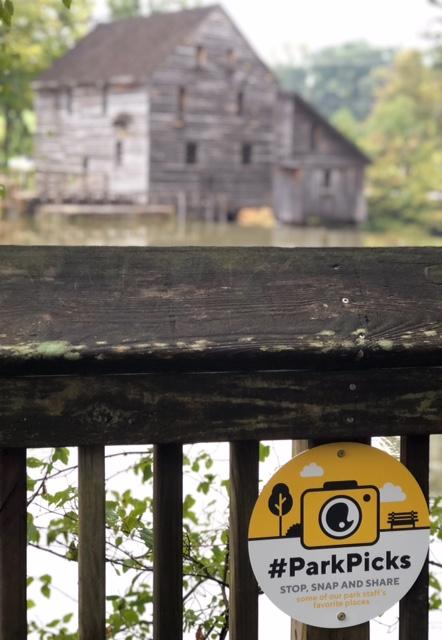
We want to see YOU in our favorite park spots! Look for the #ParkPicks sign at Historic Yates Mill County Park (head to the Mill Overlook Deck on the south side of the pond), STOP and SNAP a selfie and SHARE it with us using the hashtag #ParkPicks. We can't wait to see your selfies!
ecoExplore Hotspot

Historic Yates Mill County Park is now an official ecoExplore hotspot! You can help scientists collect data and earn badges and even prizes! This program is a wonderful and fun initiative of the NC Arboretum that not only helps nature, but helps you become an expert naturalist!
On their website you can search different hotspots and view challenges to participate in.
Park Features
The Historic Mill Building

The mill, operated by the nonprofit group Yates Mill Associates, contains multiple generations of milling technology and displays the evolution of early industries in piedmont North Carolina. Guided tours are available at published times on weekends from March through November, with corn-grinding demonstrations on the third weekend of the month in the spring and fall. All tour revenue directly supports the mill’s upkeep and operations.
Mill Hours:
The historic mill building is usually open for guided tours by appointment during the week and at published times from March through the end of November each year.
Corn-grinding demonstrations are offered on the third weekend of each month from March through June and from September through November. Visit the Mill Tours page for more information.
There is a small fee for all guided tours – note that all proceeds are given to the non-profit Yates Mill Associates and directly support the mill's maintenance and operations.
A.E. Finley Center for Education and Research
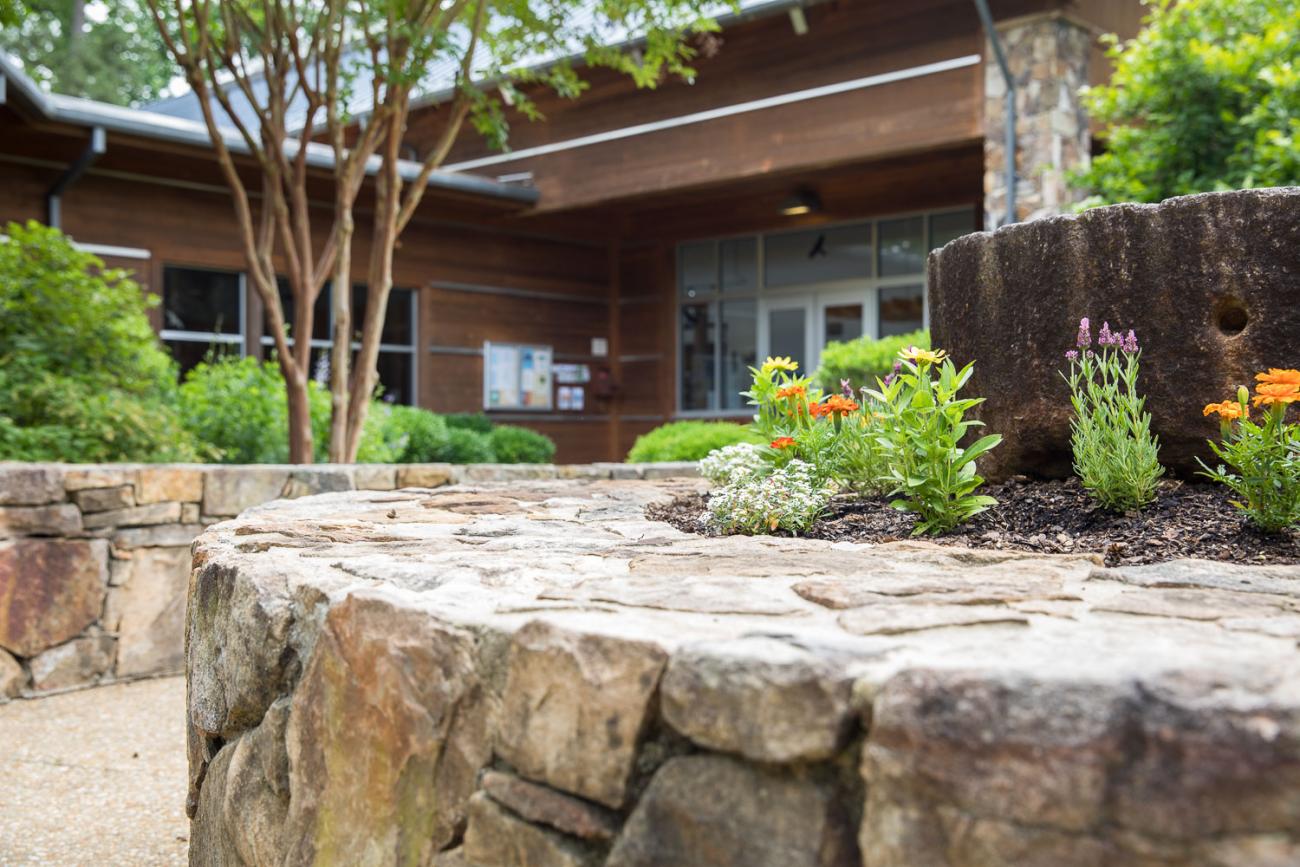
The Education Wing of the A.E. Finley Center for Education & Research houses an exhibit hall, auditorium, classrooms and staff offices. NC State University conducts biological studies in the center’s Research Wing. Enjoy an excellent view of the pond and mill from a rocking chair on the building’s back porch.
Visitor Center Hours
The center is now open to the public.
The center, including its 2,200 square-foot exhibit hall, is usually open 7 days per week, from 8:30 a.m. to 5 p.m. Admittance to the visitor center is FREE.
Use of the center's facilities must fit the park's mission and requires a fee. All use requests by outside agencies or individuals must be made within one month of the requested date(s).
EXHIBITS AND DISPLAYS
The Finley Center’s 2,200 square-foot exhibit hall contains artifacts and interpretive panels on local history, agriculture and the environment. It also features fun, self-guided activities. Park grounds include several wayside displays.
Hiking Trails

All trails close a half-hour before sunset. Pick up a copy of the Tree Identification Trail brochure at the Finley Center, and check out the park’s wildlife interpretation stations and wayside exhibits.
Millpond Trail – 1 Mile
This trail includes an accessible gravel pathway to the mill, a stone ramp to a low bridge over the creek (may be closed during flooding), stone steps through the old miller’s residence area and the pond boardwalk.
High Ridge Trail – 0.8 Mile
This naturally surfaced linear trail travels along the ridges above the pond through mixed old field pine, hardwood forests and north-facing bluffs. When combined with part of the Mill Pond Trail, the trail length can be extended to a 1.25-mile loop.
Creekside Trail – 1 Mile
This linear trail crosses over several wetland areas by way of footbridges and wooden walk-boards. After a short loop at the end of the trail, hikers will retrace their steps back to the boardwalk for a total of 2 miles.
Park Gardens
Piedmont Prairie Garden

A Piedmont Prairie is an endangered ecosystem that historically was found right here. This garden was installed to help preserve an all-but-lost habitat in North Carolina.
It is not seen very often today due to development. Only a handful of piedmont prairies are left in our nature preserves, road banks and along railroad borders.
Piedmont prairies typically grow on poor soils and, because of this, they do not support tree growth but, instead, short grasses and drought-tolerant wildflowers. Fire plays an integral part in keeping the prairies alive, through natural lightning strikes and prescribed burns. Fires reduce competition from woody shrubs and trees, creating a transitional zone between prairie and forest. Additionally, fire reduces fuel loads in the adjacent forest and controls invasive plants. Lack of burning has resulted in less prairies and more forests of pine, oak and hickory.
Pollinator Garden

This garden was installed by Girl Scout Troop 468 with park staff. In the middle of the garden, a monarch butterfly statue is featured. This was installed by the Carolina Butterfly Society in memory of frequent park visitor and butterfly enthusiast Bud Webster. The garden features all pollinator-friendly plants, as well as a newly installed bee box put together by the Girl Scouts.
Please note: Do not enter the garden or attempt to photograph with the statue, as this could cause potential harm to the plants and the statue itself.
Give us your feedback!
We'd love to get your feedback on your visits to our Wake County parks.
We hope you will use this survey to share your thoughts and suggestions.
Take Our Survey!